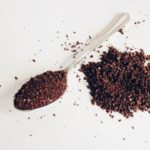We all know that caffeine is what makes coffee so addictive – and so effective. In low-ish doses, it makes us more alert and increases our ability to concentrate, at least in the short term. And coffee is one of the highest caffeine substances in the world, right?
Well, yes and no. It depends. There are several factors you need to take into account: the size of the cup of coffee you’re drinking; how strong a blend it is; your own physiology; whether it’s an espresso or a latte you’re imbibing – and, of course, whether the coffee is actually one of the decaf coffee varieties out there.
How many mg of caffeine is in the average cup of coffee?
We’re going to assume we’re talking about a smallish cup of coffee, around 8 fluid ounces. Typically, unless it’s decaffeinated coffee we’re talking about (more of that later), you’ll be ingesting somewhere between 70mg and 140mg of caffeine. The average is around 95mg. If you usually drink cups of coffee that are around 12 fluid ounces, the more usual size, then you’re taking in around 195mg per serving.
And again, it depends on exactly what you’re drinking. An 8-ounce cup of instant coffee has around 63mg of caffeine, while if it’s decaffeinated instant coffee in your cup, you’re looking at around 2mg. Brewed filter coffee, on the other hand, can contain anywhere from 95-165mg. And lattes and mochas are higher in caffeine than you might think – between 63-126mg.
Surprisingly, the amount of caffeine in an espresso is not quite as high as you might think. Even if you indulge in a double espresso at your favorite coffee shop, you’ll likely only take in about 125mg of caffeine – although that’s mainly due to the fact that espressos are typically around just 1 fluid ounce in terms of volume. Obviously, the more coffee you drink on average, the more caffeine you’re ingesting.
So what’s the average amount of caffeine in coffee?
So just how do scientists work out how many milligrams of caffeine there are in the average cup of coffee? A specialized technique called liquid chromatography is frequently used, although other methods are gradually appearing and there are even some products that now allow you to test your own drinks, although they have limitations.
Caffeine in coffee vs caffeine in tea
 So if you’re worried about the amount of caffeine there is in a cup of coffee, and what it’s doing to your body you’re taking in whenever you enjoy a cup of coffee, then tea has to a better choice, doesn’t it? Again, it depends. Brewed black tea has around 25-48mg of caffeine, while even brewed green tea has around 25-29mg (although green tea, in particular, does have other health benefits).
So if you’re worried about the amount of caffeine there is in a cup of coffee, and what it’s doing to your body you’re taking in whenever you enjoy a cup of coffee, then tea has to a better choice, doesn’t it? Again, it depends. Brewed black tea has around 25-48mg of caffeine, while even brewed green tea has around 25-29mg (although green tea, in particular, does have other health benefits).
After water, tea is the second most popular beverage in the world – although it varies between countries. Close to 80% of the tea that people drink worldwide is black tea; the two words you need to know are “camellia sinensis” as this is the main type of bush used to make black tea. Intriguingly, until the magic of the brewing process is applied, some tea leaf varieties actually have more caffeine than coffee beans. On average, though, a cup of tea has just half the amount of caffeine you will find in coffee.
What about caffeine in green tea vs coffee?
In recent years, green tea has started to become more popular; its health benefits are well-documented and it makes a refreshing change to coffee or black tea. Even green tea is not, however, completely free of caffeine. Brewed green tea has between 25 and 29mg of caffeine compared to the average 95mg in brewed coffee.
Caffeine in coffee – how it affects your body
When we drink a cup of coffee, it starts to affect us within about 45 minutes. An hour after drinking it, it’s at peak levels within our bloodstream and body, and we remain affected by it for around another four to six hours.
Believe it or not, your physiology also has an effect on how caffeine will affect you. A small, slender-framed individual will find they need less caffeine than someone who is six foot three with a build to match. And scientists now think there may actually be a genetic element to how we metabolize caffeine. They also think that whether we prefer to drink tea or coffee is down to our genes.
The caffeine content in coffee – good, bad or indifferent?
While the health benefits of caffeine for some conditions have been well-documented, and new research is constantly appearing, there are some people should take care that they don’t ingest too much caffeine. Those taking medication that contains ephedrine (commonly found in decongestants) or a theophylline (used to help relieve some bronchial conditions), for instance, should check with their medical professional to make sure that caffeine is not going to alter the effectiveness of their medications.
Even Echinacea, which many people take as an herbal supplement to help their immune systems fight off the common cold and other infections, can intensify the effects of caffeine in your body. And since, for most of us, the main source of caffeine in our diet is either coffee or tea, this essentially means we need to keep an eye on how many cups of tea or coffee we’re drinking.
How many grams of caffeine in a cup of coffee can I safely drink, then?
The general guidance in the USA, Europe and other parts of the world is that a healthy adult can take between 300 and 400mg of caffeine a day without adverse effects. This is around 5.2 espressos, 2.5 16 fluid ounce energy drinks, or 11.7 12 fluid ounce servings of cola. However, this is based on the average weight of a human, which is 197 pounds for men. In general, women weigh considerably less, at around 170 pounds.
It also doesn’t take into account the health issues that might result from taking in the large amounts of sugar in some of those drinks. Caffeine is not recommended for children although at present there is a lack of evidence to show the effects on this age group.
So tell me again, how much caffeine is in a cup of coffee?
It really, really depends. You can find out exactly how much caffeine there is in that latte you’re drinking, or that macchiato you’re imbibing, by checking on the caffeine database, which is regularly updated. So if you’re aiming to keep your caffeine intake low, choose a decaffeinated instant coffee. If you’re after a mega-hit, and you’re in good health, then there are super-high caffeine drinks on the market now like Black Label Brewed Coffee or incredibly intense coffee shots like DynaPep.
If, on the other hand, you’re looking for the sheer pleasure of the scent and the flavour of the beverage you’re drinking, but aren’t too worried about the actual caffeine content, then most outlets now will list the milligrams of caffeine there are in a cup of coffee, or the barista will be able to tell you if you ask.
But Decaff Coffee is Healthy, Right?
So how many grams of caffeine are there in a cup of decaffeinated coffee? The caffeine in coffee is one of the reasons for its bitter, distinctive taste. Don’t be fooled into thinking that decaffeinated coffee is completely free of caffeine though – again, it depends.
While 97% of the caffeine must be removed for a coffee to qualify as “decaffeinated”, if the original coffee beans were of the Robusta variety, they are naturally higher in caffeine than the Arabica variety. (All coffees are made from one of those two beans.) Coffees made from the Robusta bean generally have a much stronger, more bitter taste than the more mellow Arabica.
As with most things in life – enjoy the caffeine in your coffee, in moderation.

Hi my name is Larry, a coffee aficionado from the US. I have already visited Colombia, Sumatra, Guatemala, Costa Rica, Ethiopia and Jamaica in my pursuit of finding the best-tasting coffee beans. I currently write from Bali and enjoy the relaxed life that you can only find in Canggu. Welcome to my coffee world!





